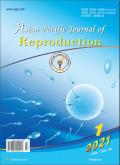生殖道感染的发病机制和苦味受体的新作用:范围综述
IF 0.6
Q4 REPRODUCTIVE BIOLOGY
引用次数: 1
摘要
生殖道感染在全球范围内引起了巨大的公共卫生关注,每年记录的新病例超过6亿例,并伴有多种并发症,包括不孕、异位妊娠、早产和新生儿死亡。尽管对病原体入侵机制的理解有所提高,但生殖道感染的发病机制尚待完全理解。最近的数据表明,生殖道苦味受体在生殖道感染的发病机制中起着关键作用。在此,我们回顾了目前生殖道感染发病机制的文献,以及生殖道苦味受体在生殖道感染发生机制中的作用。新出现的证据表明,生殖道微生物群紊乱在生殖道感染中起着关键作用。几种细菌、原生动物寄生、蠕虫寄生和病毒病原体已被确定为生殖道感染的病原体。这些病原体破坏宿主防御并激活尿上皮的特定结构单元,如Toll样受体,后者识别病原体上的保守基序。激活的Toll样受体介导下游信号传导,刺激核因子-κB,进而激活促炎细胞因子的产生。该途径还与免疫细胞募集到攻击部位和蛋白酶释放有关,蛋白酶驱动生殖道组织损伤。生殖道苦味受体检测致病成分的缺陷可能在生殖道感染的发病机制中起着关键作用。这篇综述为确定治疗生殖道感染的新前沿提供了重要信息。本文章由计算机程序翻译,如有差异,请以英文原文为准。
Etiopathogenesis of reproductive tract infections and the emerging role of bitter taste receptors: A scoping review
Reproductive tract infections pose an immense public health concern worldwide as over 600 million new cases are recorded annually along with several complications, including infertility, ectopic pregnancy, preterm delivery, and neonatal death. Despite improved understanding of the mechanisms of pathogenic invasion, the etiopathogenesis of reproductive tract infections is yet to be completely understood. Recent data has suggested a critical role of bitter taste receptors of the reproductive tract in etiopathogenesis of reproductive tract infections. Here, we review the literature on current etiopathogenesis of reproductive tract infections and the role of bitter taste receptors of the reproductive tract in etiopathogenesis of reproductive tract infections. Emerging evidence suggests a critical role of microbiota disorder of the reproductive tract in reproductive tract infections. Several bacterial, protozoan parasitic, helminthic parasitic and viral pathogens have been identified as causative agents of reproductive tract infections. These pathogens subvert host defenses and activate specific architectural units of the uroepithelium such as Toll-like receptors, which recognize conserved motifs on the pathogens. The activated Toll-like receptors mediate downstream signaling, stimulating nuclear factor-κB, which in turn activates the production of proinflammatory cytokines. This pathway is also associated with recruitment of immunocytes to the site of aggression and release of proteinases, which drive tissue damage in the reproductive tract. Defects in detection of pathogenic components by the bitter taste receptors of the reproductive tract may play a critical role in the etiopathogenesis of reproductive tract infections. This review provides important information for identification of novel frontiers for the treatment of reproductive tract infections.
求助全文
通过发布文献求助,成功后即可免费获取论文全文。
去求助
来源期刊

Asian Pacific Journal of Reproduction
Veterinary-Veterinary (all)
CiteScore
1.70
自引率
0.00%
发文量
588
审稿时长
9 weeks
期刊介绍:
The journal will cover technical and clinical studies related to health, ethical and social issues in field of Gynecology and Obstetrics. Articles with clinical interest and implications will be given preference.
 求助内容:
求助内容: 应助结果提醒方式:
应助结果提醒方式:


